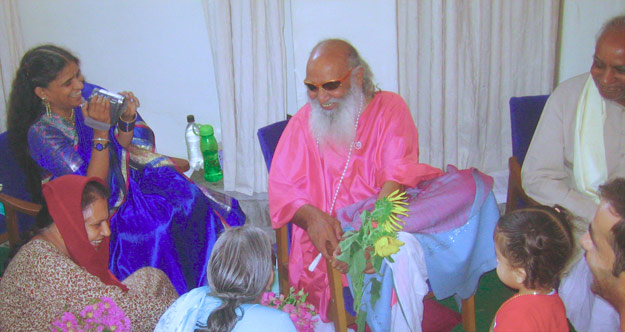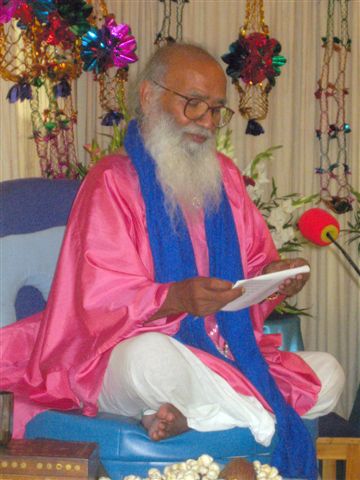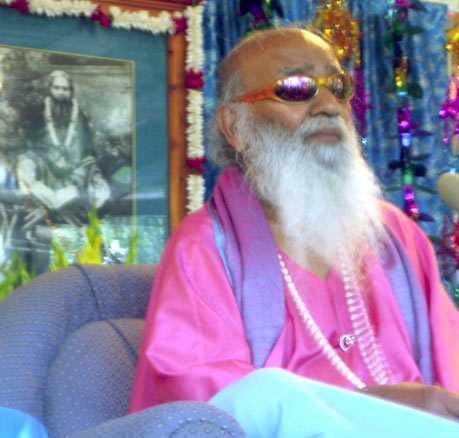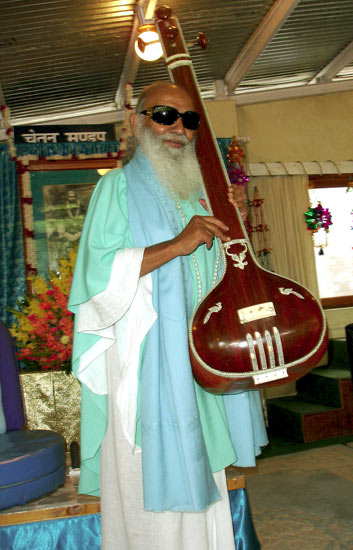Guru Poornima
Guru Gives You Deathlessness
This year, we celebrated Guru Poornima for three days. People came from around the world, across India, and around Kullu to join Swamiji on this special occasion. We enjoyed Swamiji’s inspiring talks—as well as moving speeches on Guru from several participants, sixteen beautiful songs performed by celestial singers and talented musicians, the tastiest lunch and prasaad prepared by Shyams, as well as having a special moment with Guru, when we offered him a flower or garland and he gave us one in return. On the main day, July 11th, satsang began with the song Mangal Sat Guru Roop Naam Hai.

July 11, 2006
Mangal Sat Guru Roop Naam Hai means that which is the original
space, the Pure Existence, not only of everyone, but of the whole world.
… Sat Guru means one reality. But one reality does not mean that
it is only one ocean water, forest, or sky. Mangal means delight.
Human delight is known through love and joy, as one feels through being
born a human being. It’s only a human being who can understand what he
likes. Each person likes to have his freedom, with delight. If freedom
is given and you are bound, that will not be enjoyable. It will not be
Eternal Delight, or delight that never gets broken. A human being understands
delight as joy and happiness—as against unhappiness, pain, and suffering.
But that is not what Sat Guru is.
Sat Guru is that who is ever-the-same Reality. A human being has not seen ever-the-same Reality. His eyes are limited to see forms, objects, and persons, which are born, maintained, change, and which ultimately end. So a human being knows only that. But is his true ambition that he should only be born, be happy and unhappy in his lifetime, and then die? The modern view of thinking, on the level of the mind of a human being, is that we should be happy—but happy for the attainment of the objects which delight the senses. So everyone has been trying and working to delight his senses—his eyes, ears, nose, tongue, mind, intellect, ego-sense, whatever. That is a human being. It would not be necessary for us to know more than this if we lived only with those people who are limited to this state of existence, that a human being is born and dies.
But the main desire or pure ambition of a human being is that “Life should remain forever and I should not end: I should not die.” We are all thinking human beings. It will not be possible that if we are born as human beings, we will not die. All objects which appear have to end one day. Then, why is it that a human being does not want to die? Everyone does not want to, even birds and creatures. Mosquitoes and flies have a very small existence and die early, yet they too want to live. From where has the sense appeared in a human being that death should not take place? He thinks, “If death does not take place, then I’ll be happy.” So he wants to avoid death, avoid death, avoid death. …
But for me, a person does not die. Why? He was not alive. He was not born. So I am on the side which cannot be understood. You are on the side where I understand everything that you do, everything that you think. That is Guru Consciousness. Guru Consciousness means double or cosmic Consciousness—Guru knows what the world thinks, knows, and is, and he knows what has been before the world. Guru says that “Before the world was, I am.” Guru says that “Before the world was, you are, she is, it is, he is.” Now he, I, you, and she are not one kilo of gold that you can weigh. I has no bones, blood, skin, teeth, or tongue. Then, what is in a human being—that I—which is so great that it cannot be compared with the things in the body that die? That is called Guru. Guru Consciousness is that which is always there with you. It does not die. It is not born. The body is born, so the body has to die. But you are not born, so you will not die. …
You are here to unfold the sense which is the higher sense, super sense, master sense, master awareness. In English, that is Pure Awareness. In Hindi, it is Guru Consciousness. So you want to know the meaning of Guru. Guru is not a teacher who gives you teachings that come from a tradition. In every religion, every profession, every school, there are teachings. But Guru is not a teacher. Then the first question is, What is Guru? What is the celebration of Guru Poornima? Why is Guru Poornima its name? By Christmas, you understand that there was someone who was Christ. You can also understand Diwali, that Raam came back home after victory, so it is a victory day. But what is Guru Poornima day? It does not fall in any category of a celebration. It is not the day of a week, not a day or night. So what is Guru Poornima?
 If you know that Guru
is within—and I have already defined that Guru is that I, the Self, which
is never born and never dies—then this type of thought is a greater thought,
which does not die. The thought that is applicable or joined to death
is a lower thought. Guru thought is Amaram Hum Madhuram Hum.
So those people who know that they were born and they will die do not
observe Guru Poornima day. They observe all those things where
death can be avoided. For Guru, there is no birth and there is no death.
If you know that Guru
is within—and I have already defined that Guru is that I, the Self, which
is never born and never dies—then this type of thought is a greater thought,
which does not die. The thought that is applicable or joined to death
is a lower thought. Guru thought is Amaram Hum Madhuram Hum.
So those people who know that they were born and they will die do not
observe Guru Poornima day. They observe all those things where
death can be avoided. For Guru, there is no birth and there is no death.
Then Guru Poornima is a thought and knowledge which is not like science and mathematics. It is not that one plus one is two and one minus one is zero. It is always One. Now, how can you apply your intellect and extend logic for this? Therefore, Guru Poornima is not for logicians. [Laughter.] There is no logic why I’m sitting over here, why there are flowers, all these decorations, Guruji’s photo, and all that. Why? There is no logic in Guru Poornima. …
I have begun to bring in you the meaning of You, the Guru—of I, the Guru. In other cases, up to this time you have seen that there is a Guru and a disciple. There is a mother and a child. There is a father and a son, a brother and a sister. Everywhere there are two. In a game, victory and defeat. In study, pass and fail. And in the world, birth and death. But that we have never talked about. Even when we know that we were born, then we must be aware who is born. The body is born. Then the body will grow, act, and reap the results of its doings, and one day it will leave the breath. So Guru is not born.
Many people come and say, “Guruji, Guruji, Guruji,” just like someone would say, “Mr. Prime Minister, Mr. Prime Minister.” The prime minister is such that he cannot go anywhere—he is in the seat. A prime minister and president can not be an ordinary person. You have seen all that. When your boy becomes the prime minister, he does not care for you. But Guru is not like that. For Guru, with a child, he’s a child. He’s in harmony with that. For a bird, he’s a bird. For a person who is happy, he’s happy. For a person who is unhappy, he is unhappy. For a person who has died, he died. So Guru is One in all possible ways. How would you ever think of that Oneness? Therefore, I have to thank you. …
You have come so long, on airplanes or driving and driving—sacrificing so much—from different countries, different provinces, and different places, just to listen to the meaning of Guru on Guru Poornima. It’s such a strange thing: no one likes it, so it’s only once in a year. [Laughter.] I have not broken the tradition, but I have modified it. I have brought a change, a revolution in its celebration. And that is, first things first. If you do not know Guru, you will not be able to fold your hands and say, Namastay. You cannot. You will say, “What is it to me? Why should I salute you? Why should I say anything to you?” So you say, “Hi,” and go. There is no respect in that. Why? You do not know the meaning of Guru.
If you know the meaning of the sky, then you can understand Guru. You have seen all the players—they win, and they look towards the sky, because for them, the sky is God. Why? The sky showers grace on them. And those who are defeated… [He looks down. Laughter.] So the earth is a defeat. Anybody who is born on earth is defeated. And the sky is victory. Guru is the sky. So I had told you what Guru is—it is the sky which never dies. The sky remains forever the sky. Whether things are gone or not, the world is gone or not, whether it is all dissolved or not, the sky is forever. So Guru is forever.
But a human being cannot learn this. If I think like this and become rigid, then I cannot talk about Guru. I’ll think, “Well, he cannot learn this, therefore I won’t talk.” But there are some people who are fully developed human beings born on that level where they have made the experiment, and continued making the experiment, to find out why a human being dies—whereas he does not want to die. Watch. What a great subject this is. It interests everyone. That’s why when you come over here, whatever profession you have come from, yet you are interested that “Someone should tell me the meaning of I, of myself, who does not want to die. Then why should I apply my logic in this and think, ‘No, I’ll die one day’?” …
Guru is immortal and Guru is blissful. Guru is Mangal Sat Guru Roop Naam Hai. Guru is Sat, the Truth, and the Truth is that which never changes. So all the forms and names are permeated by Guru. When it is said like that, then people feel good. But when their name is blotted, when they have no fame, when their form is degenerated and deteriorated… [then what happens?] Why is it? It means that “Guru alone is” is to be known. How will you understand this? When this earth, the oceans, and all that were not there, the sky was. But you are concerned with a human being. You think, “A man is one who speaks, and I listen to him, so he is Guru and I am a disciple. I want to be Guru, like him, so that I can have disciples.” [Laughter.] Guru and disciple will die in this way! Therefore, you have to know what I am saying.
In the beginning, I said, “Don’t apply logic, or you will not be able to get the meaning.” If you apply logic, you will be bothered that “When everyone says that we were born and we will die, then why is it that Guruji says you will not die?” I don’t say that you were not born, but I say that you won’t die, because I want to check your logic, that if you do not die, then why are you not born? I have not to say this. But if you don’t want to die, then why do you say that “I am born”?
 Therefore, on a special
day, on Guru Poornima, we get to hear the meaning of I—what that
I, the Self, the infinite Guru is, who is unborn, undying, unchanging.
I learned this verse, Mangal Sat Guru Roop Naam Hai, which Guruji
[Swami Raamanandji, Swamiji’s Guru] has written. … I have no knowledge
actually, only this one verse. Yet I pay great respect to him, I remember
him every year, perhaps every day, because he is me and I am him. He does
not remember me, because he is in a photograph. [Laughter.] But he is
with me. If he is with me, then it’s not that he’s in a photograph. If
I am with you, then you can be anywhere—in the kitchen, in the living
room, in the market, and all that. I am there. But how many of you think
that I am there? You think, “No, no, he’s on the seat, and I am over here.
I am suffering, I’m miserable, and I’m dying—and he’s sitting over there,
enjoying prasaad.”
Therefore, on a special
day, on Guru Poornima, we get to hear the meaning of I—what that
I, the Self, the infinite Guru is, who is unborn, undying, unchanging.
I learned this verse, Mangal Sat Guru Roop Naam Hai, which Guruji
[Swami Raamanandji, Swamiji’s Guru] has written. … I have no knowledge
actually, only this one verse. Yet I pay great respect to him, I remember
him every year, perhaps every day, because he is me and I am him. He does
not remember me, because he is in a photograph. [Laughter.] But he is
with me. If he is with me, then it’s not that he’s in a photograph. If
I am with you, then you can be anywhere—in the kitchen, in the living
room, in the market, and all that. I am there. But how many of you think
that I am there? You think, “No, no, he’s on the seat, and I am over here.
I am suffering, I’m miserable, and I’m dying—and he’s sitting over there,
enjoying prasaad.”
So it needs the expansion of a human mind. The human mind is that which will never transcend beyond the thought of birth and death. That is his logic. Therefore, it is totally illogical that you are unborn, you are undying. But those people among you who came to know, “Oh, the meaning that Swamiji is giving is deeper. He is saying ‘I.’ He’s not saying that he, a body, is born and is dying. No. He is saying, “’I am unborn and I am undying. I am Amaram, I am Madhuram. I am Immortal, I am Blissful.’” … But you say, “I am … [this name, this person, of this religion, of this country].” That is for your passport. I am not giving you a passport knowledge. I am giving you that passport where birth is not and death is not. That is called Guru. The celebration of that Guru means your own Self. That’s why you are well dressed and looking like very nice people. Guru has given you that body, so enjoy, decorate it, and look nice to others. …
Guru celebration is of that reality that is ever pure. A man who is existing will never know what pure is. He will know pure butter, pure ghee, pure synthetics [Laughter], or that a person is pure because he has taken a bath, meditates daily, or never tells a lie. … Whereas pure means that which cannot be understood. Understanding needs the mind and intellect. But you are listening to me without the intellect and mind. That’s why whatever I have said, you haven’t listened, yet you said [nodding], “Yeah, yeah.” [Laughter.] That is Guru. [Laughter.] That is open today. It can be continued in many ways, but we have some songs to be sung, some celebration to enjoy. It should look like a new and special day.
Just by one verse, I have given you that it’s all joy, all delight. Whenever someone says, “Swamiji, what should I do?” I say, “Be happy.” Somebody goes and says, “Swamiji, what would you like to have when I come back?” I say, “Your happiness.” They say, “That’s very difficult.” Then I say, “That’s why I’m saying it. It’s not an easy thing.” Anyone can say, “What can I contribute to you?” And I answer, “That which you have forever.” You have your happiness forever. Out of that, give me a little happiness, which means that any time you are there, be happy. Happiness is the result of knowledge.
Without knowledge, you can do anything: you may succeed in making a rabbit with horns, you can get sesame oil from sand—it’s possible, perhaps. But without the knowledge of Guru, without the meaning of Guru to imbibe in your heart, you will never be happy, never be peaceful, never be victorious, never be joyful, never be deathlessness. How important Guru is! Let me know, which important commodity gives you deathlessness? Which bills, American or Indian, give you deathlessness? Which house, clothing, quilt, or geyser gives you deathlessness? [Laughter] They give you whatever they have. In this way, Guru gives you deathlessness. … You are listening to me about a totally different outlook. I’m bringing about—in harmony—the past teachings, the modern teachings, and the teachings which are forever: you are a human being, and you are Immortal, and you are Blissful. …
Guru celebration removes your smallness, your miserliness, your anger. It makes you generous, wise, great, infinite, and eternally happy. Guru celebration gives you that knowledge with which you become Guru. To all the Gurus over here, my salutations. Amaram Hum Madhuram Hum is the name of Guru, who is unchanging, immortal, undying. I thank you, everyone who has come over here. Now, the songs will begin. Thanks a lot. [Applause.] …

July 12, 2006:
Anyone who turns you on towards your source, the Self, is your best friend.
There are two types of advice that you get. One is generally to spread
the seeds of producing flowers, fruit, trees, human beings, population,
making cities, and all that. That is one type of advice that the mind
relishes. The second is to be tuned in to your own true nature, the Amaram
Madhuram, and then to be free to do anything you like. …
So Amaram Madhuram has cosmic advantage. Name and form only have individual advantage, with which you can be defeated or you can be victorious. Like in a tennis game, there are two persons—and one of them has to be defeated. Both are scared of it, though they are playing the game, and a game is for happiness. But because there is the sense of duality, there must be concern, and all that. You have a better job, but all the time you are thinking that you might be laid off—or you might be turned on. So whenever the mind is near the body, duality is there. Whenever the mind is near Guru Poornima, it’s all high. …
Why would we meet in front of Guru if we were not Guru? So those who
are not Guru cannot see and sit in front of Guru. Thus, this is a Guru
group. It’s not a group, it’s Gur-oup. Perfect Guru. It’s Guru there and
Guru here. Therefore, it’s not the company of two persons. It is Guru
company. It is Oneness. … Amaram Hum Madhuram Hum is the greatest
and Guru. It is filling the whole world, which means making the world,
permeating the world, the way that it is made in a dream. And you are
nothing but Amaram Hum Madhuram Hum. Amaram Hum Madhuram
Hum is equal to Guru Poornima, the “Perfection of Guru.”
… This is the change: on Guru Poornima day, your mind is open
to Amaram Hum Madhuram Hum, which is your reality. The advice
of Guru Poornima day is, if you became happy one day, then for
God’s sake, the second day you shouldn’t become unhappy—neither the third
day, nor the fifth, nor for millions of years. That’s the message of Guru
Poornima. On Guru Poornima, just create a thought of paying
attention on Guru. Thank you. …
Copyright © 1999-2006 International
Meditation Institute. All Rights Reserved